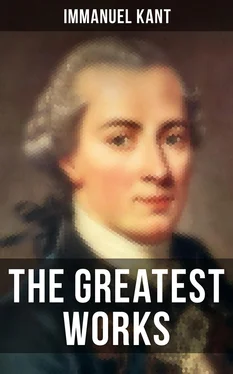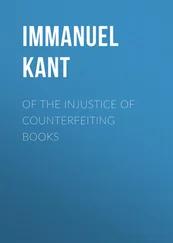By means of analysis different representations are brought under one conception — an operation of which general logic treats. On the other hand, the duty of transcendental logic is to reduce to conceptions, not representations, but the pure synthesis of representations. The first thing which must be given to us for the sake of the a priori cognition of all objects, is the diversity of the pure intuition; the synthesis of this diversity by means of the imagination is the second; but this gives, as yet, no cognition. The conceptions which give unity to this pure synthesis, and which consist solely in the representation of this necessary synthetical unity, furnish the third requisite for the cognition of an object, and these conceptions are given by the understanding.
The same function which gives unity to the different representation in a judgement, gives also unity to the mere synthesis of different representations in an intuition; and this unity we call the pure conception of the understanding. Thus, the same understanding, and by the same operations, whereby in conceptions, by means of analytical unity, it produced the logical form of a judgement, introduces, by means of the synthetical unity of the manifold in intuition, a transcendental content into its representations, on which account they are called pure conceptions of the understanding, and they apply a priori to objects, a result not within the power of general logic.
In this manner, there arise exactly so many pure conceptions of the understanding, applying a priori to objects of intuition in general, as there are logical functions in all possible judgements. For there is no other function or faculty existing in the understanding besides those enumerated in that table. These conceptions we shall, with Aristotle, call categories, our purpose being originally identical with his, notwithstanding the great difference in the execution.
| TABLE OF THE CATEGORIES |
| 1 Of Quantity Unity Plurality Totality |
2 Of Quality Reality Negation Limitation |
| 3 Of Relation Of Inherence and Subsistence (substantia et accidens) Of Causality and Dependence (cause and effect) Of Community (reciprocity between the agent and patient) |
| 4 Of Modality Possibility — Impossibility Existence — Non-existence Necessity — Contingence |
This, then, is a catalogue of all the originally pure conceptions of the synthesis which the understanding contains a priori, and these conceptions alone entitle it to be called a pure understanding; inasmuch as only by them it can render the manifold of intuition conceivable, in other words, think an object of intuition. This division is made systematically from a common principle, namely the faculty of judgement (which is just the same as the power of thought), and has not arisen rhapsodically from a search at haphazard after pure conceptions, respecting the full number of which we never could be certain, inasmuch as we employ induction alone in our search, without considering that in this way we can never understand wherefore precisely these conceptions, and none others, abide in the pure understanding. It was a design worthy of an acute thinker like Aristotle, to search for these fundamental conceptions. Destitute, however, of any guiding principle, he picked them up just as they occurred to him, and at first hunted out ten, which he called categories (predicaments). Afterwards be believed that he had discovered five others, which were added under the name of post predicaments. But his catalogue still remained defective. Besides, there are to be found among them some of the modes of pure sensibility (quando, ubi, situs, also prius, simul), and likewise an empirical conception (motus)— which can by no means belong to this genealogical register of the pure understanding. Moreover, there are deduced conceptions (actio, passio) enumerated among the original conceptions, and, of the latter, some are entirely wanting.
With regard to these, it is to be remarked, that the categories, as the true primitive conceptions of the pure understanding, have also their pure deduced conceptions, which, in a complete system of transcendental philosophy, must by no means be passed over; though in a merely critical essay we must be contented with the simple mention of the fact.
Let it be allowed me to call these pure, but deduced conceptions of the understanding, the predicables of the pure understanding, in contradistinction to predicaments. If we are in possession of the original and primitive, the deduced and subsidiary conceptions can easily be added, and the genealogical tree of the understanding completely delineated. As my present aim is not to set forth a complete system, but merely the principles of one, I reserve this task for another time. It may be easily executed by any one who will refer to the ontological manuals, and subordinate to the category of causality, for example, the predicables of force, action, passion; to that of community, those of presence and resistance; to the categories of modality, those of origination, extinction, change; and so with the rest. The categories combined with the modes of pure sensibility, or with one another, afford a great number of deduced a priori conceptions; a complete enumeration of which would be a useful and not unpleasant, but in this place a perfectly dispensable, occupation.
I purposely omit the definitions of the categories in this treatise. I shall analyse these conceptions only so far as is necessary for the doctrine of method, which is to form a part of this critique. In a system of pure reason, definitions of them would be with justice demanded of me, but to give them here would only bide from our view the main aim of our investigation, at the same time raising doubts and objections, the consideration of which, without injustice to our main purpose, may be very well postponed till another opportunity. Meanwhile, it ought to be sufficiently clear, from the little we have already said on this subject, that the formation of a complete vocabulary of pure conceptions, accompanied by all the requisite explanations, is not only a possible, but an easy undertaking. The compartments already exist; it is only necessary to fill them up; and a systematic topic like the present, indicates with perfect precision the proper place to which each conception belongs, while it readily points out any that have not yet been filled up.
Our table of the categories suggests considerations of some importance, which may perhaps have significant results in regard to the scientific form of all rational cognitions. For, that this table is useful in the theoretical part of philosophy, nay, indispensable for the sketching of the complete plan of a science, so far as that science rests upon conceptions a priori , and for dividing it mathematically, according to fixed principles, is most manifest from the fact that it contains all the elementary conceptions of the understanding, nay, even the form of a system of these in the understanding itself, and consequently indicates all the momenta, and also the internal arrangement of a projected speculative science, as I have elsewhere shown. 16 Here follow some of these observations.
I. This table, which contains four classes of conceptions of the understanding, may, in the first instance, be divided into two classes, the first of which relates to objects of intuition — pure as well as empirical; the second, to the existence of these objects, either in relation to one another, or to the understanding.
The former of these classes of categories I would entitle the mathematical, and the latter the dynamical categories. The former, as we see, has no correlates; these are only to be found in the second class. This difference must have a ground in the nature of the human understanding.
Читать дальше












